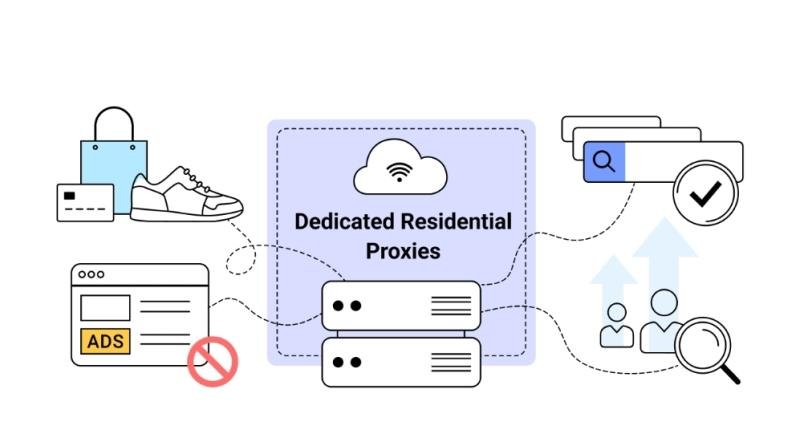In an age where every click, search, and scroll leaves a trail, protecting your online footprint has never been more crucial. Whether you’re pulling market intelligence, verifying ads in different countries, or managing dozens of social profiles, one tool consistently stands out: residential proxies.
A quality residential proxy masks your real IP with a genuine household IP, helping you appear like a regular user – not a bot or server farm. But with so many services claiming to be the best, choosing the right one can feel like navigating a maze.
To save you time (and headaches), we’ve researched, tested, and ranked the best residential proxies to trust in 2025. Let’s break down why residential proxies matter – and which providers actually deliver what they promise.
Why Residential Proxies Matter in 2025
The internet’s walls keep getting higher. Websites are investing more in bot detection, regional content blocks, and aggressive anti-scraping firewalls. For businesses and individuals who rely on accurate data – like price monitoring, SEO research, or brand protection – hitting these barriers can halt progress fast.
Unlike VPNs or datacenter proxies, residential proxies give you access to real household IP addresses. This means your online activities blend in naturally with regular traffic, drastically lowering the chance of blocks, CAPTCHAs, or suspicious flags.
In 2025, using the right residential proxy isn’t just about privacy – it’s about staying competitive. For eCommerce teams, ad agencies, sneaker resellers, and even cybersecurity professionals, a trusted residential proxy is the secret weapon that keeps operations smooth and under the radar.
What to Look For in a Quality Residential Proxy
Not every residential proxy service is worth your money – or your trust. Here’s what separates the best from the rest:
Transparent IP sourcing: The top providers ethically source IPs through ISPs or verified partnerships – not shady peer-to-peer tricks. NetNut, for example, uses a direct ISP network, which means you’re never dependent on random user devices.
Connection stability: Dropped connections or slow speeds can kill scraping projects and waste your budget. Look for networks that maintain consistent performance, even under heavy loads.
Smart rotation & control: Quality residential proxies should let you rotate IPs automatically or stick with one for longer sessions, depending on your use case.
Flexible geo-targeting: Whether you need to appear in London, Los Angeles, or Lima, a good proxy network should give you city- and country-level options.
Scalable pricing & support: From solo operators to large teams, plans should fit your scale – and reliable 24/7 support shouldn’t be optional.
Top 5 Best Residential Proxy Providers in 2025 (Ranked)
Below is our up-to-date roundup of the best residential proxies this year. We weighed each provider’s IP quality, speed, transparency, and value – so you can pick with confidence.
#1. NetNut – Best for Direct ISP Integration
NetNut sits at the top of our 2025 list for a simple reason: it delivers unmatched stability by tapping directly into ISP networks instead of relying on unpredictable peer-to-peer user devices. This means you get genuine residential IPs – minus the headaches that come with random user drop-offs.
NetNut’s pool spans millions of real household IPs worldwide, with pinpoint geo-targeting and multiple session types (rotating or sticky) to fit any project. Whether you’re collecting competitor data, verifying localized ads, or managing multiple online identities, NetNut’s clean infrastructure makes it easy to scale up without surprise slowdowns.
Highlights:
Direct ISP-sourced IPs – zero end-user dependency
Reliable speeds and high success rates
Easy geo-targeting across regions and cities
Friendly dashboard and responsive support team
Flexible pricing for growing businesses
Try Today: https://netnut.io/residential-proxies/
#2. GeoSurf
GeoSurf has been a respected name in the proxy world for years, offering high-quality residential IPs across more than 130 countries. Their dashboard is simple enough for first-timers but packed with features for advanced campaigns.
One standout is GeoSurf’s premium location targeting, which lets you choose IPs from very specific regions – useful for ad testing and compliance checks. However, GeoSurf’s plans can get pricey compared to NetNut, and they have a slightly smaller IP pool.
Highlights:
Good location diversity
User-friendly dashboard
Reliable for ad verification and testing
Trusted provider with strong reputation
#3. IPRoyal
IPRoyal is gaining traction among freelancers and small businesses who want a solid residential proxy option without spending a fortune. They maintain a clean, ethically sourced peer-to-peer network with decent speeds for scraping, SEO tasks, and social media automation.
While IPRoyal’s IP pool isn’t as massive as some big players, it’s often enough for lighter tasks – just don’t expect the same direct ISP infrastructure that NetNut offers.
Highlights:
Affordable entry-level plans
Simple integration for bots and scripts
Pay-as-you-go options available
Solid customer reviews for support
#4. ProxyEmpire
ProxyEmpire markets itself as a budget-friendly alternative with a decent spread of residential IPs worldwide. They’re popular with sneaker coppers and small-scale scrapers who need rotating IPs on the fly.
ProxyEmpire also gives you some targeting flexibility by region, but speeds and reliability can fluctuate during peak demand – something NetNut’s direct ISP backbone avoids entirely.
Highlights:
No minimum commitments
Fresh IP pool with constant updates
Good option for smaller campaigns
Supports rotating and sticky sessions
#5. Storm Proxies
Storm Proxies has been around for a while, carving out a niche with its plug-and-play residential proxy pools. They’re particularly popular among sneakerheads and ticket scalpers thanks to their easy setup and simple pricing.
While Storm Proxies does offer rotating residential IPs, their pool is smaller and speeds can vary – so it’s best suited for hobbyists or niche projects rather than serious enterprise operations.
Highlights:
Simple, affordable plans
No complex setup needed
Rotating backconnect residential IPs
Good starter option for basic use cases
Frequently Asked Questions About Residential Proxies
Are residential proxies safe to use?
Yes – as long as you’re using a reputable provider, residential proxies are safe and legal for tasks like web scraping, ad validation, and localized SEO. Stick to trusted companies that source their IPs ethically, like NetNut, to avoid legal headaches or shady peer-to-peer networks.
Will a residential proxy slow down my connection?
A good residential proxy shouldn’t drag your speeds down too much. Because the traffic is routed through real household IPs, you might see a slight dip compared to your regular connection – but with providers like NetNut that tap directly into ISPs, the performance hit is minimal.
What’s the difference between residential proxies and mobile proxies?
Both hide your real IP, but residential proxies use household broadband connections, while mobile proxies rely on 3G/4G/5G carrier IPs. Residential proxies tend to be more stable for large-scale scraping or ad verification, while mobile proxies shine when you need ultra-fresh, rotating IPs from mobile networks.
Can residential proxies get blocked?
They can – but they’re far less likely to be flagged than datacenter IPs. Sites are designed to detect traffic that looks robotic or suspicious. Because residential proxies mimic normal household users, your chances of getting blocked drop dramatically – especially with reliable rotation and ISP-direct IPs like NetNut’s.
How do I know which residential proxy is right for me?
Think about what you need: volume, geo-targeting, speed, and reliability. If you’re just testing the waters, a small peer-to-peer network might work short-term. But for mission-critical tasks that need consistency and scale, a provider like NetNut – with its direct ISP integration – will save you time, money, and frustration.
P.O Bagarji Town Bagarji Village Ghumra Thesil New Sukkur District Sukkur Province Sindh Pakistan 65200.
Wiki Blogs News always keeps careful online users to provide purposeful information and to keep belief to provide solution based information.
This release was published on openPR.


















